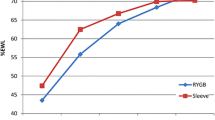Abstract
Background
Laparoscopic sleeve gastrectomy (LSG) is increasing worldwide; however, long-term follow-up results included insufficient weight loss and weight regain. This study aims at assessing the outcomes of converting LSG to laparoscopic Roux-en-Y gastric bypass (LRYGB) and laparoscopic re-sleeve gastrectomy (LRSG).
Methods
A total of 1300 patients underwent LSG from 2009 to 2012, of which 12 patients underwent LRYGB and 24 patients underwent LRSG in Al-Amiri Hospital alone. Data included length of stay, percentage excessive weight loss (EWL%), and body mass index (BMI).
Results
Twenty-four patients underwent conversion from LSG to LRSG, and 12 patients underwent conversion from LSG to LRYGB due to insufficient weight loss and weight regain. Eighty-five percent were females. The mean weight and BMI prior to LSG for the LRYGB and LRSG patients were 136.5 kg and 52, and 134 kg and 50, respectively. The EWL% after the initial LSG was 37.9 and 43 %, for LRYGB and LRSG, respectively. There were no complications recorded. Results of conversion of LSG to LRYGB involved a mean EWL% 61.3 % after 1 year (p value 0.009). Results of LRSG involved a mean EWL% of 57 % over interval of 1 year (p value 0.05). Comparison of the EWL% of LRYGB and LRSG for failed primary LSG was not significant (p value 0.097).
Conclusion
Following our algorithm, revising an LSG with an LRSG or LRYGB for poor weight loss is feasible with good outcomes. Larger and longer follow-up studies are needed to verify our results.


Similar content being viewed by others
References
Baltasar A, Serra C, Pérez N, et al. Re-sleeve gastrectomy. Obes Surg. 2006;16:1535–8.
Himpen J, Dobbeleir J, Peeters G. Long-term results of laparoscopic sleeve gastrectomy for obesity.
National Institutes of Health. Clinical guidelines on the identification, evaluation, and treatment of overweight and obesity in adults: the evidence report. Obes Res. 1998;6:51S–209S.
Almazeedi S, Al Sabah S, Alshammari D. Routine trans-abdominal ultrasound before laparoscopic sleeve gastrectomy. Obes Surg. 2013. doi:10.1007/s11695-013-1092-y.
Almazeedi S, Al-Sabah S, Alshammari D, et al. The impact of Helicobacter pylori on the complications of laparoscopic sleeve gastrectomy. Obes Surg. 2014;24(3):412–5. doi:10.1007/s11695-013-1108-7.
Gagner M. 5th international consensus summit for sleeve gastrectomy: is there a consensus. Bariatric Times. 2015;12(4 Supple A):A22–3.
Gagner M, Gumbs A. Gastric banding: conversion to sleeve, bypass, or DS. Surg Endosc. 2007;21(11):1931–5.
Bohdjalian A, Langer FB, Shakeri-Leidenmühler S, et al. Sleeve gastrectomy as sole and definitive bariatric procedure: 5-year results for weight loss and ghrelin. Obes Surg. 2010;20:535–40.
Langer FB, Bohdjalian A, Shakeri-Leidenmühler S, et al. Conversion from sleeve gastrectomy to Roux-en-Y gastric bypass-indications and outcome. Obes Surg. 2010;20:835–40.
Deguines JB, Verhaeghe P, Yzet T, et al. Is the residual gastric volume after laparoscopic sleeve gastrectomy an objective criterion for adapting the treatment strategy after failure? Surg Obes Relat Dis: Off J Am Soc Bariatric Surg. 2006;9:660–6.
Zundel N, Hernandez JD. Conversional surgery after restrictive procedures for morbid obesity. Surg Laparosc Endosc Percutan Tech. 2010;20:338–43.
Switzer NJ, Karmali S. The sleeve gastrectomy and the how and why it can fail? Surg Curr Res. 2006;4:3.
Langer FB, Bohdjalian A, Felberbaure F, et al. Does gastric dilatation limit the success of sleeve gastrectomy as a sole operation for morbid obesity? Obes Surg. 2006;16:166–71.
Iannelli A, Schneck AS, Noel P, et al. Re-sleeve gastrectomy for failed laparoscopic sleeve gastrectomy: a feasibility Study. Obes Surg. 2011;21:832–5.
Cesana G, Uccelli M, Ciccarese F, et al. Laparoscopic re-sleeve gastrectomy as a treatment of weight regain after sleeve gastrectomy. World J Gastrointest Surg. 2014;6(6):101–6.
Sarwer DB, Dilks RJ, West-Smith L. Dietary intake and eating behavior after bariatric surgery: threats to weight loss maintenance and strategies for success. Surg Obes Relat Dis. 2011;7(5):644–51.
Author information
Authors and Affiliations
Corresponding author
Rights and permissions
About this article
Cite this article
AlSabah, S., Alsharqawi, N., Almulla, A. et al. Approach to Poor Weight Loss After Laparoscopic Sleeve Gastrectomy: Re-sleeve Vs. Gastric Bypass. OBES SURG 26, 2302–2307 (2016). https://doi.org/10.1007/s11695-016-2119-y
Published:
Issue Date:
DOI: https://doi.org/10.1007/s11695-016-2119-y




